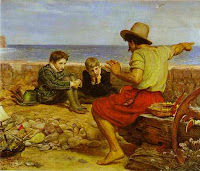

‘I’m going down to Edderside with the flat-cart.’ Mrs. Tomlinson shouted. ‘You kids want to come along?’
Mrs. Tomlinson was a Londoner who spent her summers at Allonby helping out at the riding school, booking and saddling up and taking the rides. I never once saw her wearing anything other than her rust-coloured jodhpurs, green tweed riding jacket and black velveteen riding hat. We marvelled at her exotic London accent. ‘Eow, come on,’ she’d yell when we moaned about the rain ‘It’s only gonna be a sheower’ (We imitated those London vowels gleefully.) She was always accompanied by her dog, Pindy, a black Scottie who usually rode in the basket of his owner’s ‘sit-up-and-beg’ bicycle
A ride on the flat-cart! The others were not to be told twice. My sister ran to the cottage and informed our mother that we were going. I, as ever, had doubts. The flat-cart was another danger to me. It was indeed flat, but it sloped downwards front to back. It had no sides, and there was nothing for passengers to hold on to. I had ridden on it once of twice before, but just for short distances, and I had felt very insecure. It seemed to me that one stayed on the thing by some strange form of gravity which I did not trust.
But I was swept along by the enthusiasm of the others - they couldn’t wait. Mrs. Tomlinson patted Jimmy Mac, the trotter (he could trot very fast without breaking into a canter) and threw her dog, Pindy, onto the cart where he settled down happily. We all scrambled aboard. Mrs. Tomlinson took the reins, her legs dangling over the side. A couple of the others sat along the sides legs dangling in imitation. I sat as near to the middle of the cart as I could, crouching with my legs tucked under me, trying to find a fingerhold, but found I had to real purchase anywhere.
Mrs. T. shook the reins and clucked at Jimmy Mac who set off, soon breaking into his customary trot.
We were on the road now, and Jimmy Mac’s hooves sound sharp and staccato , like bullet shots. The others chatted excitedly. We were soon clear of the village, and the safety of home was receding fast. Edderside was only about 3 miles out of the village, but everything familiar had been left behind and the countryside was alien.
Every so often the cart would lurch a little and I would feel myself slipping towards the back. I clung on, praying we would get there. Eventually we reached the farmhouse, where Mrs. T. went about her business (I don’t remember what it was). The others were fired up with the joy of their adventure, laughing and shouting. My throat was dry, but I pretended to join in. Then, as Mrs. T. reappeared I realised my torment was to begin again.

Once again I clung on. The dusk was gathering now, the blue-grey sky cool and threatening. I crouched and dug my nails into one of the gaps between the slats of the cart, picking up a splinter or two. I hoped fervently that I would get back alive. Didn’t the others appreciate the danger? Didn't they realise that we could slither off this swaying fairground-ride and dash our skulls to pieces on the tarmac? They were still prattling on merrily, completely unconcerned , legs swinging nonchalantly and arms waving excitedly. But I was in a state of fear, slipping a milimeter further towards the edge at every trotting step.. I could see the road flashing by through the cracks between the slats. I slid a little further down the cart. I could see how the back dipped with the weight of us all and almost scraped the ground . Just get me home, I prayed , Get me home
Of course, we all got back to the village safely. And I see myself on this photograph, kneeling happily on the flat-cart, looking blissfully confident. Nobody knew how filled with a myriad of fears I was - fear of the horses, fear of riding, fear of being too far from home, fear of falling off the flat-cart…
 Jimmy Mac and the Flat-Cart.
Jimmy Mac and the Flat-Cart. Front row: Elaine with 'Chummy', Jackie, Isa


















